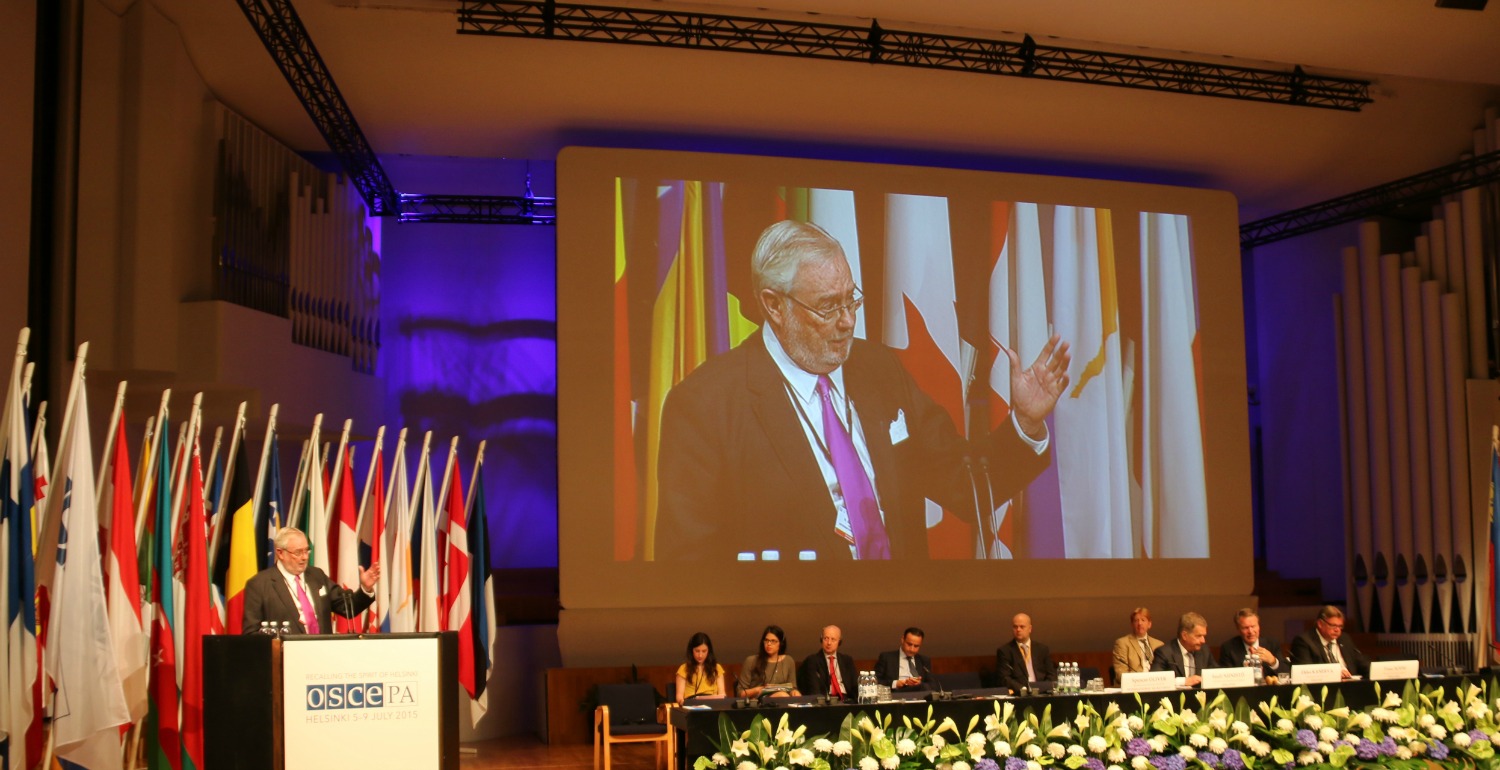Spencer Oliver saw the foundation of the Helsinki Commission as its first Chief of Staff, from 1976 to 1985. After subsequent service as Chief Counsel at the House Foreign Affairs Committee, he served as the first Secretary General of the OSCE Parliamentary Assembly from October 1992 to December 2015.
Spencer Oliver, a personal witness to the diplomacy that brought trans-Atlantic relations from the Cold War era to the present, recently paid a visit to the Helsinki Commission offices he first opened in 1976. After a nine-year tenure as the Commission’s first Chief of Staff, Mr. Oliver remained involved with the Helsinki Process through his subsequent career in the Congress and at the OSCE Parliamentary Assembly. Mr. Oliver gave a short interview on the Commission’s accomplishments over four decades, and prospects for the future.
Before the establishment of the Helsinki Commission in 1976, Oliver observed, “human rights were not really a component of U.S. foreign policy. It was the Commission that made a strong effort for President Carter to make human rights a definite element in his foreign policy portfolio.”
He recalled a private foreign policy strategy meeting in the fall of 1976 with then-candidate Jimmy Carter’s foreign policy team. Then-Helsinki Commission Chairman Dante B. Fascell, a U.S. Representative from Florida, made a pitch about why human rights should be on Carter’s agenda. Senator Hubert Humphrey, a very close friend and advisor to Carter, slammed his hand on the table and said, “By golly, Dante’s right! Human rights ought to be one of the principal pillars of the Carter foreign policy!”
After Carter took office, Chairman Fascell and his staff, including Mr. Oliver, met with the new President’s Secretary of State, Cyrus Vance, to discuss a plan to make human rights a U.S. foreign policy priority. They recommended that: 1) the State Department position of “Coordinator of Humanitarian Affairs” be elevated to a full Bureau for Human Rights and Humanitarian Affairs; 2) Patricia M. Derian, a civil rights activist from Mississippi, become the first Assistant Secretary of State to head that Bureau; 3) the Assistant Secretary also become the State Department’s representative on the Helsinki Commission; and 4) the Helsinki Commission be fully integrated into inter-agency CSCE planning and the U.S. Delegation to the upcoming CSCE Review Meeting in Belgrade. The Secretary agreed and implemented these recommendations, despite resistance within the State Department.
“Without Dante Fascell and Patt Derian, human rights probably would not have had the place it eventually did in American foreign policy,” Oliver observed.
Oliver mentioned with sadness the passing of Derian in May 2016.
Mr. Oliver explained that the Helsinki Commission was also partly responsible for creating the practice of human rights implementation, review, and accountability. At the 1977 Belgrade Review Meeting, the Helsinki Commission participants in the U.S. Delegation articulated specific cases of human rights abuses and violations of the Helsinki Accords committed by the Soviet Union. In response, the Soviet delegation shot back with criticisms of U.S. human rights issues, such as racism and poverty, to which the United States responded by investigating and reporting factually on these concerns. By publishing a human rights compliance report, the United States set a precedent for accountability on the part of all Helsinki Final Act signatory states.
“The Helsinki Accords,” Oliver explained, “were not just about how the countries treat one another, but also about how countries treat their own citizens.”
Noting that, today, Russia’s human rights conditions are worse than they have been since the collapse of the USSR, Mr. Oliver recalled moments that looked more promising. Accompanying Fascell to Moscow in April 1986, he was among the first American officials to meet with Mikhail Gorbachev after his consolidation of power as leader of the Soviet Union. In a four-hour meeting at the Kremlin on a Saturday morning, Mr. Oliver expected Gorbachev to find recourse to concerns raised by displaying the same defensiveness and counter-criticism as previous Soviet leaders. Instead, Gorbachev was honest about the issues his country was facing, and expressed his intention to enact economic and political reforms to open the Soviet Union up to the rest of the world. Mr. Oliver left that meeting feeling encouraged about the direction of the USSR.
This progressive streak in Russian leadership was short-lived, as illustrated by Vladimir Putin’s increasingly authoritarian rule and denial of basic freedoms. Mr. Oliver believes that Putin’s rise to power and current popularity result from the turmoil and economic devastation of the 1990s, compounded with his tight grip on the media. “There’s no country in the world where the dictator controls the media and he isn’t running at 80 percent in the polls,” he said.
In terms of U.S. policy towards Russia, Mr. Oliver believes that strengthening and widening those economic sanctions already in place would put the most pressure on the Russian government to change its ways. “When the Russians invaded Crimea, they broke every one of the ten principles of the Helsinki Final Act,” he said. “We should let the Russians know that we don’t intend to back off until they change their ways.” In the meantime, the Commission can continue to play an important role maintaining the gains made in promoting human rights through bilateral as well as multilateral diplomacy.








